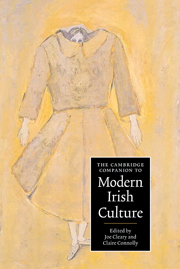Book contents
- Frontmatter
- 1 Introduction: Ireland and modernity
- Part I Cultural politics
- 2 The survival of the Union
- 3 Language, ideology and national identity
- 4 Religion, identity, state and society
- 5 Republicanism, Nationalism and Unionism
- 6 Irish feminism
- 7 Migration and diaspora
- 8 The cultural effects of the Famine
- Part II Cultural practices and cultural forms
- Index
4 - Religion, identity, state and society
from Part I - Cultural politics
Published online by Cambridge University Press: 28 May 2006
- Frontmatter
- 1 Introduction: Ireland and modernity
- Part I Cultural politics
- 2 The survival of the Union
- 3 Language, ideology and national identity
- 4 Religion, identity, state and society
- 5 Republicanism, Nationalism and Unionism
- 6 Irish feminism
- 7 Migration and diaspora
- 8 The cultural effects of the Famine
- Part II Cultural practices and cultural forms
- Index
Summary
Religion and everyday life
Being Catholic or Protestant has been fundamental to what Irish people have done and said over the past two hundred years. It has been central to family life, education, health care and social welfare and has influenced the schools people attended, the friends they had and who they married. Religion has reached into areas such as the businesses, shops and pubs used by people; as well as the sports played and the newspapers and magazines read. In many ways, Catholics and Protestants in Ireland occupied two different, divided, social worlds. These worlds necessarily overlapped in business and everyday life, of course,but the doctrinal division between Catholicism and Protestantism remained central to commonly held conceptions of national and individual identity.
Religious identity in modern Ireland has been as socially significant as gender, class, ethnicity or sexual orientation. There is nothing uncommon about this. Throughout history and in the contemporary world, religious affiliation has been a major social divider. What made Ireland exceptional throughout the twentieth century was that while the rest of Western Europe became increasing secularised, religious affiliation remained a strong social marker for the Irish. In the terms adopted in this chapter,what mattered was not so much that Irish people were labelled as Catholic or Protestant, but that they were good Catholics and Protestants and could be identified within their communities as having accumulated spiritual capital.
- Type
- Chapter
- Information
- The Cambridge Companion to Modern Irish Culture , pp. 59 - 77Publisher: Cambridge University PressPrint publication year: 2005
- 4
- Cited by



